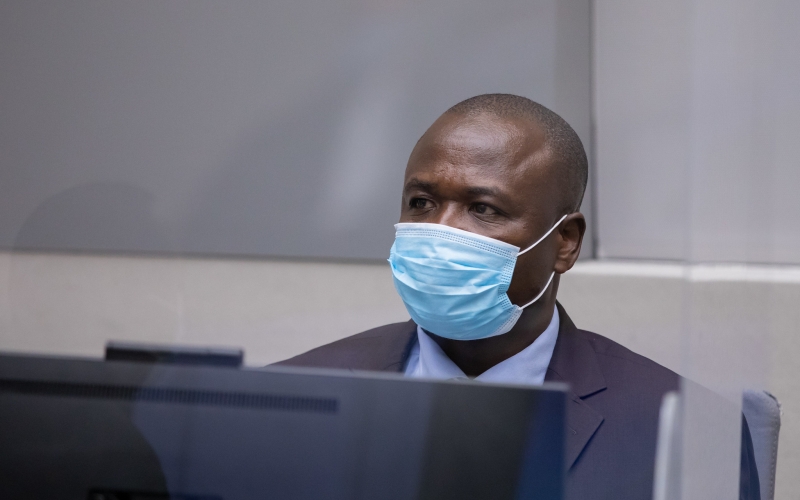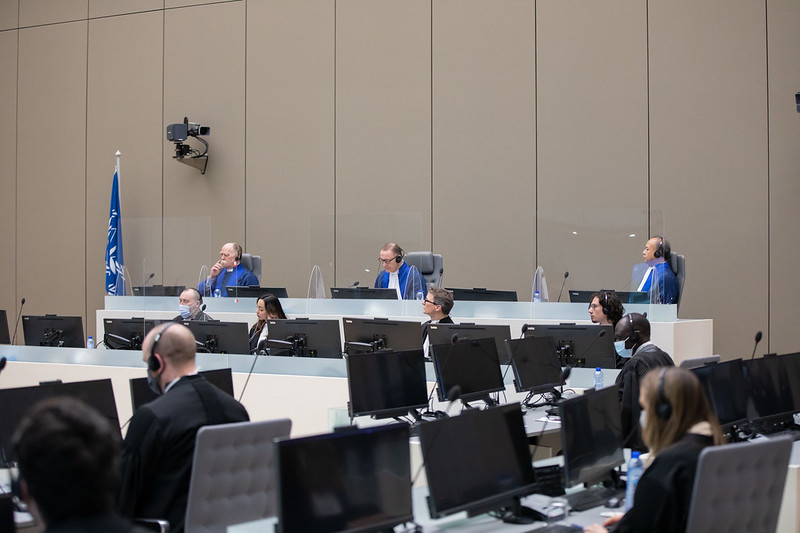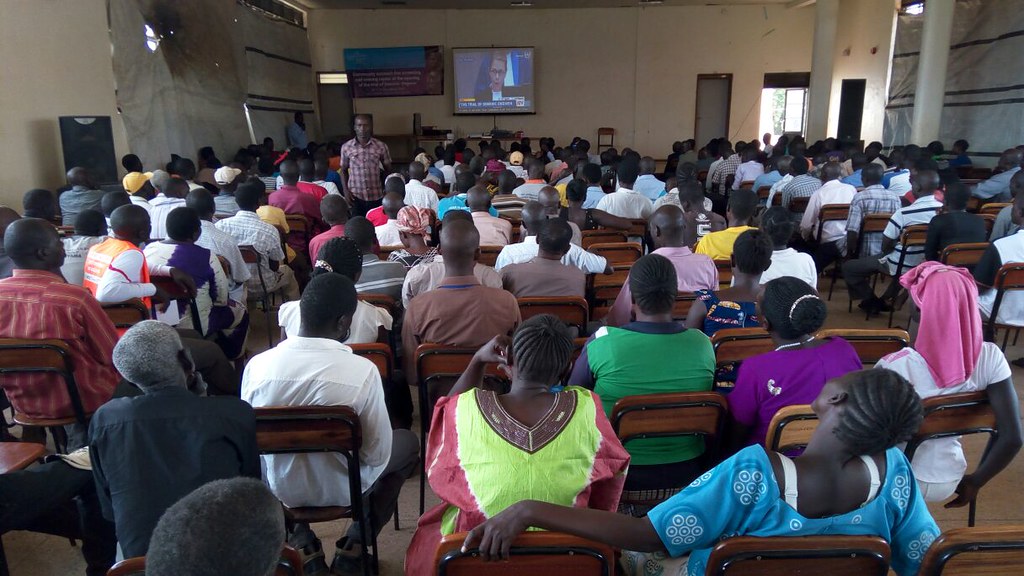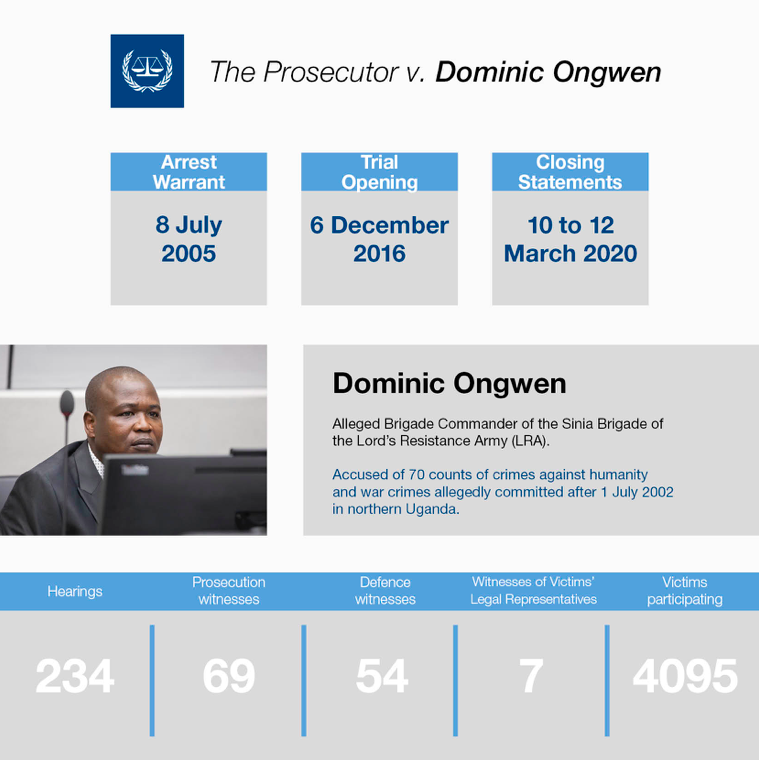Trial Chamber IX found Mr Dominic Ongwen guilty of 61 counts of Crimes Against Humanity and War Crimes

On 4 February 2021, Trial Chamber IX of the International Criminal Court (ICC) found the former Lord's Resistance Army (LRA) Commander Mr Dominic Ongwen guilty of 61 counts of war crimes and crimes against humanity committed in Northern Uganda between 2002 and 2005, including murder, torture and sexual and gender-based crimes (SGBC) of rape, sexual slavery, forced marriage and forced pregnancy.
 Trial Chamber IX, composed of Presiding Judge Bertram Schmidt, Judge Péter Kovács and Judge Raul Pangalangan, delivered an oral summary of the written decision establishing Mr Ongwen's responsibility beyond reasonable doubt. In the summary, Presiding Judge Schmidt provided a detailed account of the four attacks on Internally Displaced People (IDP) camps in Northern Uganda, during which the crimes were committed. In delivering the oral summary, Trial Chamber IX mentioned the names of the victims involved in the crimes, wher it was possible to identify them, as "those victims have the right not to be forgotten". (Trial Chamber IX, photo credit ©ICC-CPI)
Trial Chamber IX, composed of Presiding Judge Bertram Schmidt, Judge Péter Kovács and Judge Raul Pangalangan, delivered an oral summary of the written decision establishing Mr Ongwen's responsibility beyond reasonable doubt. In the summary, Presiding Judge Schmidt provided a detailed account of the four attacks on Internally Displaced People (IDP) camps in Northern Uganda, during which the crimes were committed. In delivering the oral summary, Trial Chamber IX mentioned the names of the victims involved in the crimes, wher it was possible to identify them, as "those victims have the right not to be forgotten". (Trial Chamber IX, photo credit ©ICC-CPI)
For many years, Ugandan civil society, including the Ugandan national Coalition for the ICC, has advocated for accountability for grave crimes nationally and through the ICC. Today, Ugandan civil society welcomes the decision as a new chapter in the fight to bring perpetrators of international crimes to justice.
"The victims of the heinous activities that were perpetrated by Ongwen and others can now heave a sigh of relief” said Mohammed Ndifuna, Executive Director of Justice Access Point-Uganda (JAP), organization member of the Ugandan national Coalition for the International Criminal Court. “The many years of waiting have not been in vain ....and a clear message has come through: the arm of the law is long and reaches out in every little village where international crimes have been committed. The victims of the international crimes committed by Ongwen have been punished - and at long last there will be reparations to the victims. The ICC has answered the call of the victims in this regard"
“The conviction of Dominic Ongwen is a crucial step towards accountability for the crimes committed by the LRA in Uganda, the first situation investigated by the ICC" affirmed Sheila Muwanga, Vice President of the International Federation for Human Rights (FIDH). "It serves as a strong message to other LRA commanders who are still active and responsible for atrocious crimes committed in the region that they can be held accountable for their actions.” (read the full press release)
In accordance with Article 76(1) of the Statute, The Chamber will now proceed to considering the appropriate sentence for Mr Ongwen, taking into account the relevant evidence presented and the submissions made during the trial. Trial Chamber IX will allow the Prosecutor, Mr Ongwen’s defence and the representatives of victims to present further submissions in that regard, in a hearing which will be conducted in April 2021.
The ICC trial of Mr Dominic Ongwen represents a milestone in the history of the Court.
The dual status of child soldiers as victims and perpetrators
Mr Ongwen is the first commander of the LRA facing justice before an international court.
The LRA is a military group accused of committing brutal attacks against the civilian population since its insurgency began in the late 1980s in Northern Uganda and other neighboring states. In particular, the LRA is famous for allegedly conscripting child soldiers. Mr Ongwen himself was a victim of the LRA, which kidnapped and manipulated him at the age of 14 into becoming a child soldier.
“The LRA terrorized the people of northern Uganda and its neighboring countries for more than two decades,” said Elise Keppler, Associate International Justice Director at Human Rights Watch. “One LRA leader has at last been held to account at the ICC for the terrible abuses victims suffered. Would-be rights violators should take note that the law can catch up with them, even years later.” (read the full article)
The dual nature of Mr Ongwen as both victim and perpetrator has been a central issue throughout the trial, both in the courtroom and among commentators. The defense argued that Mr Ongwen’s kidnapping as a boy and his military education should have negated his criminal responsibility. The prosecution, on the other hand, recognized his victimization and asked that it be taken into account during sentencing but reaffirmed that it should not nullify Ongwen’s responsibility.
In delivering its verdict Trial Chamber IX recognized the experience of suffering of Mr Ongwen consequent to his abduction by the LRA at the age of 9, but reminded that this case is "about crimes committed by Dominic Ongwen as a fully responsible adult and as a commander of the LRA in his mid to late twenties".
New chapter in accountability for SGBC
Civil society has been advocating for SGBC to receive the attention it deserves in the field of international justice and in the ICC courtroom. The Ongwen trial has been crucial in this regard. With 19 counts underlining 11 SGBC charges, it was the first ICC trial addressing a broad spectrum of sexual and gendered violence.
The approach taken in the Ongwen case reflects Prosecutor Fatou Bensouda’s commitment to address these often-overlooked crimes and advance international jurisprudence on the matter. The Ongwen case is the first time the ICC prosecuted the crime of forced marriage as a crime against humanity falling under “other inhumane acts” as well as the first time any international court prosecuted the crime of forced pregnancy. As the Prosecutor laid out in her pre-trial brief: “Women were treated as spoils of war, awarded as prizes without any more say in the matter than if they had been animals or inanimate objects.” The trial also highlighted sexual violence against men and boys, an under-reported, under-recognized and under-punished crime that has only much more recently gained traction in the field of international criminal law. While the Legal Representatives of Victims’ request to call witnesses to testify on this form of violence was rejected, the request did serve to draw attention to the prevalence of these crimes against male victims.
In its judgment, Trial Chamber IX found Mr Ongwen guity of several counts of sexual and gender-based crimes includind rape, sexual slavery, forced marriage, and for the first time before an international court for the crime of forced pregnancy. While delivering the verdict, Presiding Judge Schmidt provided detailed description of the heinous crimes committed by Mr Ongwen and the LRA.
Today’s conviction is only the second ICC conviction for SGBC crimes, after Bosco Ntaganda’s 2019 conviction. Jean-Pierre Bemba’s earlier conviction for the crimes against humanity of rape and murder and the war crimes of rape, murder and pillaging was later overturned on appeal.
“Today’s decision to hold Dominic Ongwen responsible for sexual and gender based crimes is part of a positive progression in creating a strong body of law and jurisprudence on sexual violence at the international level,” said Melinda Reed, Executive Director of Women’s Initiatives for Gender Justice. “Holding a key LRA figurehead accountable for the atrocities perpetrated against countless victims in and around Uganda, it is our hope that accountability and justice will continue to be served for those who have suffered at the hands of the LRA.“ (read the full article)
Highest levels of victims’ participation to date
The Ongwen trial featured the highest level of victims’ participation in the history of the ICC: 4,107 victims weregranted the right to participate in the proceedings.
Given the substantial growth in victims’ participation at the ICC during this case and the rights granted by the Rome Statute to victims to participate under separate legal representatives, the Court needed to clarify several elements of its victims’ participation process, including the determination that independently appointed victims’ representatives can be entitled to ICC legal aid.
“The significance of the decision allowing the participation of victims in the Dominic Ongwen case cannot be overstated." stated Sharon Nakandha, Program Officer at Open Society Foundations (Africa Regional Office). Whereas the extent and quality of participation was largely dependent on the diligence of the legal team assigned to each participating victim, this process gave them a voice and contributed to their healing as many spoke openly about the atrocities they experienced. In the course of the trial, victims provided information on the LRA attacks against them while in the IDP camps including the widespread killings, abductions, incidents of sexual violence, property and livelihood losses et cetera. During consultations, they not only shared about their tribulations but also stories of resilience as well as their hope for justice in a conflict-free world. The participation process is however imperfect by design—victim participation is limited to only those within the case locations who are the victims of the accused’s crimes and therefore left out many others who equally suffered at the hands of other LRA commanders like Joseph Kony still at large. Going forward, it is important for the court to determine a reparation model that provides redress for all these victims as a reminder that their inability to participate in the trial does not take away from their victimhood.”
Since 2008, the Trust Fund for Victims has run assistance programs in Northern Uganda, under its assistance mandate, to provide material and psychological support and rehabilitation to victims and former child soldiers in particular.
Following Mr. Ongwen’s conviction, a phase dedicated to the reparation proceedings will be opened. The Rome Statute establishes victims’ rights to seek and receive reparations. Reparations are not limited to monetary compensation. They can come in many forms, including rehabilitation. Reparations are decided by the Court’s judges and — when ordered by the judges — administered by the Trust Fund for Victims.
Ongwen's trial is significant for victims and conflict survivors in northern Uganda who endured years of human rights violations and atrocities” affirmed Lino Owor Ogora, Ugandan transitional justice and peacebuilding practitioner. “The trial sends a clear message that impunity will not go unpunished. At the same time, civil society organizations are also cognizant of the fact that Ongwen was forcefully conscripted into the LRA and therefore hope that a special rehabilitation program will be provided for him. Post the verdict, civil society organizations hope that the ICC will implement a comprehensive reparations program in northern Uganda, targeting not only victims who participated in the case, but also communities who suffered.”
Improved accessibility and visibility of court proceedings
 Over 10,000 people in Uganda followed the opening of the trial through live broadcasts facilitated by the ICC field office, which organized public screening events in cooperation with stakeholders and civil society organizations in 25 affected communities in Northern Uganda and in Kampala. (People in Uganda following the Ongwen trial, photo credit ©ICC-CPI)
Over 10,000 people in Uganda followed the opening of the trial through live broadcasts facilitated by the ICC field office, which organized public screening events in cooperation with stakeholders and civil society organizations in 25 affected communities in Northern Uganda and in Kampala. (People in Uganda following the Ongwen trial, photo credit ©ICC-CPI)
The delivery on 4 February of the verdict was also followed by people in Gulu, Uganda, who gathered to watch the broadcasting.
"Ever since the International Criminal Court (ICC) delivered its verdict on former Lord’s Resistance commander, Dominic Ongwen, to us engaged young people, principally student community on ICC issues, the guilty verdict has popularized the court and has earned the trust of ordinary citizens in the public domain, especially among the victims in Northen Uganda," said Mike Gesa Munabi, Chief Advisor at Students for Global Democracy Uganda. "However more outreach programs and resources for returnees is needed to address psychosocial trauma and contribute to their meaningful living in society”.
The great attendance demonstrates the high level of interest that victims and affected communities have in the Ongwen trial. It also serves as a reminder for the ICC of the importance to involve in the proceedings victims and communities affected by the alleged crimes on trial.
Other reactions of CICC Members to the verdict
ICC Convicts Ongwen of 61 War Crimes and Crimes Against Humanity - Open Society Justice Initiative
The Ongwen Verdict: A Step Closer to Acknowledgment and Justice for Victims in Northern Uganda
Uganda: First ICC Conviction of an LRA leader - Human Rights Watch
Procedural background
Uganda became the first state to refer a situation on its own territory to the ICC when the Ugandan government invited the prosecutor to open an investigation into alleged crimes committed in Northern Uganda, where the government had been fighting Joseph Kony’s LRA for many decades.
Mr Dominic Ongwen was among five high-ranking LRA commanders subject to the first ICC arrest warrants, issued in 2005, for war crimes and crimes against humanity. Mr Ongwen became the first LRA suspect to be transferred into ICC custody after he surrendered to United States troops in the Central African Republic in January 2015. He appeared before the ICC for the first time on 26 January 2015.
On 23 March 2016, Pre-Trial Chamber II confirmed the charges against Mr Ongwen.
The trial opened on 6–7 December 2016 before Trial Chamber IX.
The closing statements in the case took place on 10–12 March 2020.
The judgment has been delivered on 4 February 2021 with a summary of the verdict read out in the courtroom.
Over the course of 231 hearings, Trial Chamber IX heard 69 witnesses and experts called by the prosecution, 54 witnesses and experts called by the defense and 7 witnesses and experts called by the legal representatives of the victims.

(photo credit ©ICC-CPI)
